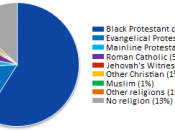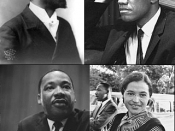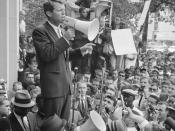"comming of age in mississippi" by anne moody and "black boy" by richard wright
The books "Coming of Age in Mississippi" by Anne Moody and "Black Boy" by Richard Wright are both very well written, interesting books. Although the two books are not completely identical, they are very similar. They are both stories about individuals standing up for what they believe in. The main characters in each book, Essie Mae in Coming of Age in Mississippi, and Richard in Black Boy, are both African Americans from down South America in the early 1900's, and both of these characters believed in helping the civil rights movement. Essie Mae, who later changed her name to Anne, was a strong believer in the NAACP, and was considered a leader in the civil rights movement. Richard Wright was a writer and a communist who believed strongly in helping the oppressed, and later became a famous writer, who's writings are to this day still successful in furthering the movement.
Each book shows an in depth perception of how each of the contemporary white societies plagued African Americans. Both books cover topics such as injustices, inequalities, and racial violence that African Americans had to endure. Both of these books were written by African Americans and both discussed the hardships that many African American families had to face. These two books also show and prove how strong willed individuals who stand up for themselves, and what they believe in, excels above the rest.
Both of the books discussed above focus in on the many hardships that African Americans had to face as individuals and as families. In Anne Moody's book "Coming of Age in Mississippi", poverty, violence and racism plagued African Americans. The main character Essie Mae (Anne Moody) was the child of poor sharecroppers working for a white farmer's plantation. Times were hard for the family to survive there and got even worse when Essie's cousin burnt down the house and blamed it on Essie. This just added to hardships Essie would endure. Later, Essies father splits on the family, leaving his pregnant wife, mother of four, to raise the family herself on a salary she earned from working at a local café. This made it very hard for them to get by. The only thing the mother had to keep her going in the face of poverty and racial inequalities was love and inspiration from Essie and her siblings. Growing up, Essie suffered many hardships from racism, both at school and at work for her white employers.
One example is when she was told that she was not allowed to sit with her white friends at the show; instead she had to sit in the balcony with the other African Americans. This made things harder for Essie as she was growing up, a female who was employed by age nine. Times got so bad that the pressures from the white society drove her brother in-law into attempted murder, where Essie, now named Anne, got shot in the foot trying to stop the feud. When Anne graduated from high school she wanted to go to college, but lacked the funds to get there, she was lucky enough to get a basketball scholarship to a poor black college in Mississippi, Natchez College, where she received straight A's. She later gets seriously involved with the NAACP and the SNCC, but white supremacists make it hard for her and her family. As a matter of fact, when Essie, now named Anne, does a sit in at a local bus stop, an angry mob of white racists try to kill her, she nearly escapes with her life.
In Richard Wrights book "Black Boy", the reader is made aware of the many hardships that African Americans had to endure. Richard's father left Rich and his family when Rich was very young. He left the mother to raise her two sons all by herself. Well, the mothers stress eventually accumulated and she ends up suffering a stroke. This left Rich to work to make up for lost wages so he, his brother and his mother could live. This wound up taking up most of Rich's time, leaving Rich very little time for schooling and very little time for relationships with family and friends. Richard was considered an alcoholic at the age of six. His family eventually moved to live with Richard's Uncle Hoskins. Uncle Hoskins was a successful saloon owner and always had food on the table. Well that didn't last long because some white racists jealous of Hoskins saloon earnings murdered uncle Hoskins and threatened Richards family, who soon fled to the other side of Arkansas. This was just a little too much for Richard to cope with and his mother decided he should attend religious classes taught by his Aunt Addie. This situation adds to the hardships Richard must face as he grows up. Aunt Addie liked to beat Richard whenever she could get her hands on him, and her husband agreed. Richard, however did not, and would fend them off with knives or other weaponry. This is how he learned to fend for himself. Richard, an African American, also faced many hardships on the job. Being a poor black man, he was often taken advantage of by his white employers, and on one occasion was chased of the grounds by white supremacists who said skilled work was not meant for black people.
Yes, times where hectic for Richard, who had to steal and rob in order to come up with funds to make it to Memphis in hopes of a new career. Richard is then later forced out of a job due to the great depression. He then tires of the hardships and joins the communist party in hopes of helping the oppressed.
Anne Moody and Richard Wright both focused in on the problem of racism, and its negative impact on African American society. In "Coming of Age in Mississippi", Anne Moody describes what it was like growing up around racism as an African American. At the age of four, her family worked for a white farmer. As she was growing up, she was told by whites that she wasn't allowed to sit with her white friends at special events; she had to sit in special designated areas for black people. This lead to some insecurity. Essie wound up changing her name to Anne while in high school so she could fit in better. She grew up around racism and was aware of how it could affect lives. As a matter of fact, Anne became emotionally scarred when her fourteen year old friend was murdered by white men because he whistled at a white lady. She was in high school and events like that were all too familiar. She recalls asking one of her favorite high school teachers, Mrs. Rice, what the NCAAP was. Mrs. Rice explained to her what it was and later was incidentally fired. It seems as if though the high school she attended was severely racist, because interracial relationships were not tolerated or permitted, and almost always resulted in violence. An example of this attitude can be presented as follows. When Anne was hired by her employer, a white supremacist lady named Mrs. Burke, to tutor her son, her son developed a crush on Anne. This really ticked Mrs. Burke off and she couldn't understand why her son had a crush on a colored woman. Mrs. Burke then purposely made life miserable for Anne, and Anne quit. Another racist incident that tortured Anne in her high school days was when black empowerment leader Samuel O' Quinn was planning a secret NAACP meeting. The principle of Anne's high school let the cat out of the bag and Samuel was shot down by white supremacists. Anne learned a lesson that day and developed a hatred for her principal and "uncle toms" like him. Anne sees that racism is destroying lives and wants to do something about it. Later, her brother in law, upset about the pressures of the white world, accidentally shoots Anne in the foot while trying to kill his wife. Anne is upset, but puts the blame where it belongs, on the white society that burdens the black man. One of the biggest incidents involving racism, however, was when Anne decided to do a sit in at a local bus stop. An angry mob of white supremacists spot her and try to kill her. She was lucky to make it out alive.
In the book "Black Boy" by Richard Wright, racism was a main concern and focus of discussion. It appears that Richard had been plagued by racism all his life and keeps fighting against it. When Richard was young and living with his mother and brother at his Aunt and Uncle Hoskins' house, Richards Uncle Hoskins was murdered. A bunch of white racist supremacists got jealous over Uncle Hoskins saloon earnings and killed him. They then proceeded to threaten Richard and the rest of his family, causing Richard and his family to flee across state. This made things very difficult for Richard, and he was still having trouble finding work because of racism. In his time, racism was a huge problem with no avoidance. Racism was every where, in school, in public, and even at work. Rich finally landed at an optical company doing skilled labor. He was hired by a white man to teach other African Americans how to do skilled optical work. Well, one day a bunch of white supremacists chased him off the grounds taunting that blacks weren't permitted to do skilled labor. When he went to his employer to complain, the same employer who hired him to teach other African Americans skilled labor, the employer didn't stick up for him and sided with the supremacists. This really drove at Richard. He eventually moved north to Memphis, where he found work at another optical shop with a white co-worker and a black co-worker. Sadly enough, racism was still present. The white worker tried to trick the two into killing each other. This lead to a boxing match between Richard and the other African American co-worker.
Sick of racism, Richard tried to find more work in Chicago. He landed a job with an insurance company, but it did not last long because this was a racist insurance company who was taking advantage of poor black men by giving them long hard hours and minimal pay. It seemed as if though no matter where he was, Richard could not escape racism.
Through all the hardships and racism present in their contemporary societies, the strength and prosperity of African Americans was key. In "Coming of Age in Mississippi" Anne's good will and strength reined victorious. When her cousin George Lee burnt down the family house and blamed it on her, she kept her head up. Anne (Essie Mae) also gave her mother the support and inspiration she needed in order to go on. Anne was a very hard working, smart, pretty girl. She had a job by the age of nine, became valedictorian in the eighth grade, and got straight A's though out her high school career and was also involved in many extra curricular activities. She earned two basketball scholarships and graduated from two colleges with straight A's, one being the best black college in Mississippi. She became very aware, at an early age, of how negatively racism can impact lives. She then developed a strong interest, at an early age, in the NAACP, and actually followed up on it becoming active in the civil rights movement. After graduating from Natchez College, she devoted most of her time to working for the NAACP and the SNCC, despite all of the racist conflicts surrounding her. Anne then went on to graduate from the best black college in Mississippi.
Despite racial injustices and inequalities of Richard Wright's time, his strength and good natured heart reined champ. In the story "Black Boy" Richard is a very strong individual who stands up for what he believes in. He was an avid reader; and by the age of sixteen, published a short story in a local black newspaper. That was quite an achievement for Richard, especially under the circumstances he lived with. He learned to never give up, and during the great depression he worked many exhausting jobs, but never let his spirits so far down that he could not get back up. Despite hardships of his time, he continued reading avidly and writing privately. He began publishing poetry in various leftist and revolutionary magazines, which ultimately lead to him joining the communist party. He hoped to be able to influence and help the oppressed by writing for communist publications. He enjoyed being a communist, but eventually resized that they work of fear not facts. Richard later then moved to New York, where he became the Harlem editor of "The Daily Worker". He never let racism stop him, and over the next couple of years he published some amazing literature that still inspires activists to this day.
In conclusion, after having read "Coming of Age in Mississippi" by Anne Moody, and "Black Boy" by Richard Wright, one is only right to form an opinion. The racism in that time period was absurd and should not have been tolerated. The two stories where different in that one focused on a females perspective, and the other on a males perspective. However, it is my opinion that the two were vary similar in that both contemporary societies were practically identical. Racism plagued both, and in both, strength and willingness succeeded. Also, interestingly enough, both of the main characters in both books went on to become famous professional writers. Richards' novels are still read and worshiped to this day. Anne went on to work with black empowerment leaders such as Jackie Robinson and Dr. Martin Luther King; and her literature is still loved to this day. I would recommend both of these books to read to anyone, especially those interested in the civil rights movement.


